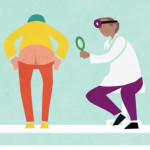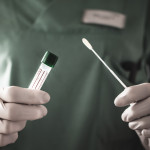HIV-positive people diagnosed with anal cancer have a survival rate similar to their HIV-negative counterparts, according to a study published August 15 in the Alimentary Pharmacology & Therapeutics.
The rates of some non-AIDS-related malignancies, particularly anal cancer, are higher in people with HIV than in their HIV-negative counterparts. What’s more, the number of people with HIV diagnosed with anal cancer each year has grown, rather than decreased, since the introduction of potent antiretroviral therapy. Experts believe the higher rate is at least partly due to the high prevalence of human papillomavirus (HPV) infection in HIV-positive people. What’s more, some studies have suggested that when people with HIV get cancer, they have poorer survival than HIV-negative patients.
To determine anal cancer survival rates, Laurent Abramowitz, MD, from the Hôpital Universitaire Bichat, in Paris, and his colleagues examined the medical records of all patients with anal cancer referred to one of six French hospitals for treatment between 1998 and 2004.
The analysis included 151 patients: 44 were HIV positive, and 107 were HIV negative. All of the HIV-positive patients were male—compared with 27 percent of HIV-negative patients—and their average age was 45 compared with 62 in HIV-negative patients. There were no significant differences in tumor stage at the time of referral or in the mode and frequency of treatment. The proportion of patients who had serious side effects to cancer chemotherapy was the same in both groups.
Abramowitz and his colleagues found that 82 percent of the HIV-positive patients had a complete response to cancer treatment compared with 75 percent of the HIV-negative patients. The overall survival rate for both groups over a three-year follow-up period was about 85 percent for both groups.
Given the similarity in treatment response and survival rates, the authors recommend that standard anal cancer treatment guidelines be followed regardless of HIV status.
Advertisement
Advertisement
Advertisement






3 Comments
3 Comments